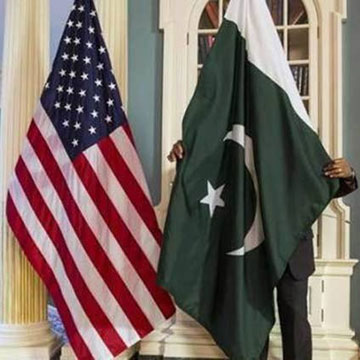 Washington:
Washington: A group of South Asia experts in US drawn from various think tanks has recommended to the Trump administration a hardening of Washington's stance towards Pakistan if it does not stop the use of terrorism in Afghanistan and India.
Among its recommendations are a review of whether Pakistan fits the criteria for designation as a ''State Sponsor of Terrorism,'' and a ban in travel to the US of Pakistani military and Inter-Services Intelligence (ISI) officials, current and former, who are known to have facilitated acts of terrorism.
While Pakistan narrowly escaped being included in the list of seven Muslim-majority countries whose nationals were barred from entry to U.S last week (even though a senior Trump administration official has said the matter may be reviewed), the ''Report of the Experts Working Group on Pakistan Policy'' stops short of seeking an immediate designation of Islamabad a state sponsor of terrorism, saying it would lead to an irreparable breach in the relationship. Instead, it calls for graduated measures, including linking all aid to deliverables.
The report says for too long, the US has given Islamabad a pass on its support for some terrorist groups based in Pakistan, including those used against India. ''Pakistani officials have privately argued that local terrorist groups such as Jaish-e-Muhammad or Lashkar-e-Taiba are too powerful and pervasive for the military establishment to challenge now.
The U.S. should no longer settle for Pakistan's excuses for delaying a full-throttle crackdown on these terrorist groups and should instead hold Pakistan accountable for the activities of all terrorist groups on its soil,'' the report recommends.
It calls on the new Trump administration to be prepared for the possibility of an escalation in India-Pakistan tensions and plan ahead for how it would intervene to defuse any potential military crisis by looking at the firm stance U.S took against Pakistani support for anti-India militant groups.
The U.S should continue to reject Pakistani calls to play a mediator in Kashmir, thus sending, as previous administrations did, a clear signal that it holds Islamabad responsible for escalating regional tensions.
While calling for the continuation of a hands-off policy on the Kashmir issue, the report says a firmer U.S. commitment to remain engaged in helping Afghans achieve a stable and peaceful state and society is critical to motivating Pakistan to reassess the support it has given to the Taliban and its allies over these many years.
The wavering level of commitment to Afghanistan by previous administrations, together with timelines for withdrawal based largely on U.S. domestic political considerations, has undoubtedly contributed to Pakistan's hedging its bets in Afghanistan by supporting the Taliban and its allies, it argues.
''The US should no longer sacrifice its anti-terrorism principles in the region for the sake of pursuing an 'even-handed' South Asia policy, but rather should levy costs on Pakistan for policies that help perpetuate terrorism in the region.
In particular, US officials must break the habit of trying to balance policies toward India and Pakistan and should instead pursue shared mutual interests with each. At the same time, the US should be modest about its ability to bridge what divides India and Pakistan,'' the report recommends.
While recognizing that decreased US military aid to Islamabad could lead Pakistani leaders to seek stronger ties with traditional allies like China and Saudi Arabia and also explore new partnerships as with Russia, the report says ''fortunately, these nations share the US goal of containing terrorism in the region and preventing Indo-Pakistani hostilities and may be cooperative with the US, especially in crisis circumstances.''
In any case, it maintains, Washington's policy should not be constrained by fear that other countries will displace the US role in Pakistan. ''American interests in the region are not served by Pakistan's strategic thinking, which is fueled by the belief that India seeks to weaken and then dismantle Pakistan. Nor are American interests fully compatible with Pakistan's desire to steer events in Afghanistan and counter any Indian role there. Continued US assistance, offered in the hope of a gradual change in Pakistan's terrorism policies, only provides Pakistan an economic cushion and better quality military equipment to persist with those policies,'' the report states.
Signatories to the report include Lisa Curtis of Heritage Foundation, Bruce Riedel of Brookings Institution, Christine Fair of Georgetown University, and Husain Haqqani and Aparna Pande of Hudson Institute.
 Washington: A group of South Asia experts in US drawn from various think tanks has recommended to the Trump administration a hardening of Washington's stance towards Pakistan if it does not stop the use of terrorism in Afghanistan and India.
Washington: A group of South Asia experts in US drawn from various think tanks has recommended to the Trump administration a hardening of Washington's stance towards Pakistan if it does not stop the use of terrorism in Afghanistan and India. 